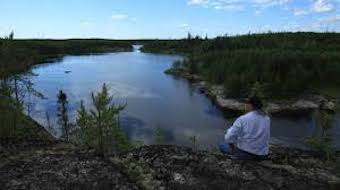Conservation in North America is evolving, bringing in new stakeholders whose voices have been little heard in the mainstream until recently. Today, indigenous peoples are increasingly being recognized for the tremendous value they bring to the process of protecting and preserving our wild spaces. And CCA believes that it’s about time! Why wouldn’t we seek the input of peoples who’ve been successful stewards of the land for millennia?
Among the groups leading the way is The Nature Conservancy of Canada (NCC). NCC believes that we have much to learn from indigenous peoples, and that new partnerships being forged today will make The Conservancy better land managers and conservationists. Being themselves a leading conservation organization, with a number of dedicated and skilled persons in their employ (and among their large corps of volunteers), they’re also well positioned to assist indigenous communities in achieving their conservation goals. NCC has a great business model that’s enabled them to build resources, expertise and considerable goodwill among the public. In the years ahead they plan to work in support of indigenous-led projects, and in other cases as partners in joint initiatives.
We at CCA believe that this kind of forward thinking comes at a critical time in our history.
The need to achieve lasting outcomes in the fields of conservation and land management couldn’t be more pressing. Indigenous peoples had successfully sustained themselves on this continent for at least 14,000 years. Despite this fact, since the time of first contact about half way through the last millennium, the newcomers to this land have considered it near-axiomatic that, in all things, their way was the better way. The land and its resources have been treated as if they were inexhaustible, and subject to indefinite exploitation. Or to use a kinder word – indefinite development.
It’s time for us to shift our thinking. No one societal grouping, of any definition, has a monopoly on truth. In the clash of civilizations that followed first contact, tremendous value in our midst was dismissed as irrelevant by an overwhelming tide as a more technologically-advanced society asserted its dominion. This was a significant mistake. But one we can learn from.
We can only improve our understanding if we choose to bring back into the public discourse those communities who’ve long understood humankind’s proper relationship to the natural world. Not as the sole residents at the pinnacle, but as a part of the whole, woven into the fabric along with every other living thing. And with an awareness of our responsibilities to both our past and our future, as we make decisions affecting our planet today.
“We do not inherit the Earth from our ancestors, we borrow it from our children.”
While the origin of this commonly heard saying is uncertain, there can be absolutely no doubt that pre-contact Native American societies understood very well the importance of humility, and that we are connected to all things in the world around us. That we must act responsibly if we are to pass on a healthy environment to future generations, who will have every bit as much right to it then as we do to it now. To restore a relationship to the natural world which is harmonious and in balance.
Man who believe he reigns supreme does so at his own peril. Dominion over the Earth, as a concept, needs to die a well deserved death. We can replace it with something much better. And a great place to start is by forging these partnerships which will work so much to our mutual benefit.
Next week, I’ll introduce you the Lummi Nation, a tribe that’s historically lived on the Salish Sea coasts of northern Washington and southern British Columbia. Known also by the traditional name Lhaq’temish, they’ve long been effective advocates for environmental justice. What I particularly admire them for is their prescience and deep understanding of the world around them, as reflected in their beliefs about the orcas that live in those waters. To the Lhaq’temish orcas are people – with languages and cultures of their own.
A view I also believe to be 100% accurate, and one which our cultural mainstream is finally beginning to recognize.
For The Orca’s Voice,
Chris, Canadian Cetacean Alliance



Leave a Reply